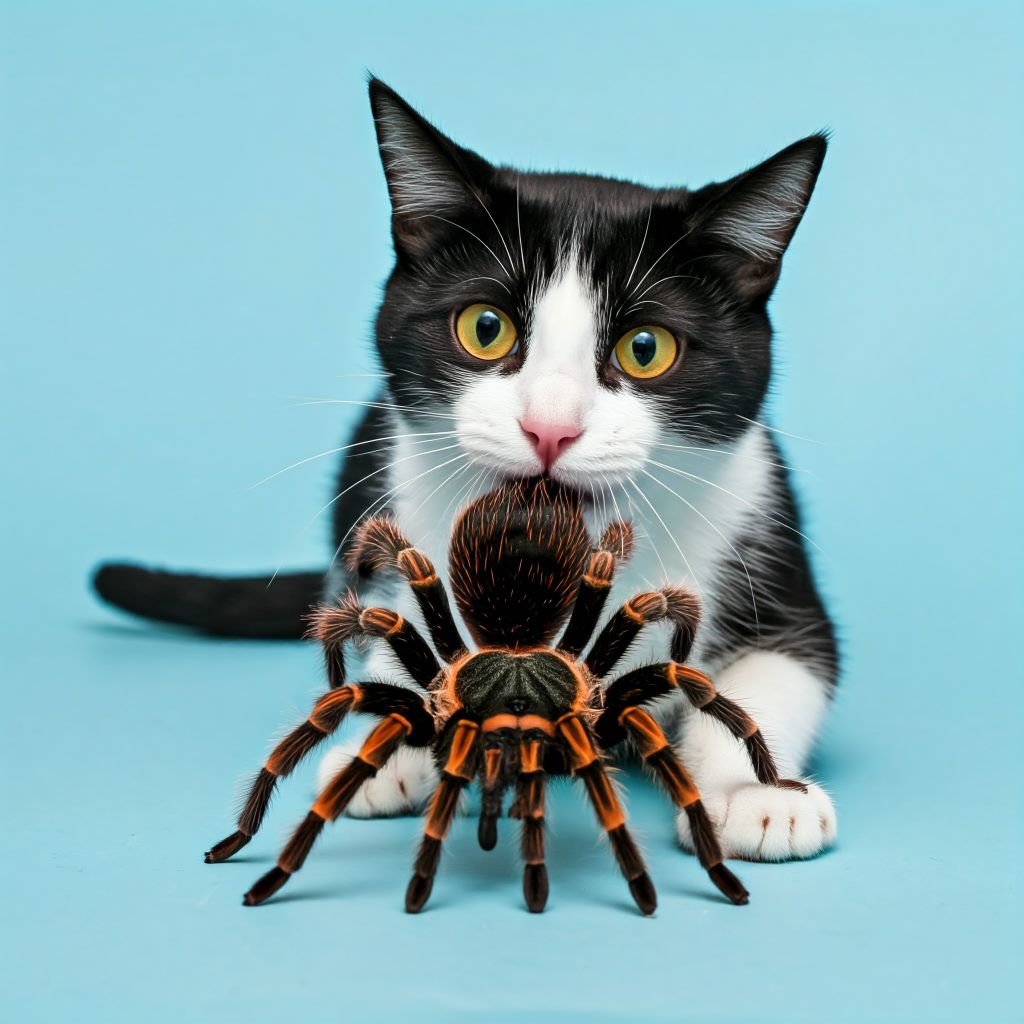
Yes, cats can eat tarantulas. Tarantulas are actually one of the best sources of protein for cats, as well as being high in fat and low in carbs. The most important thing to remember when giving your cat a tarantula is that they need to be alive so that they can be properly digested by your cat. Tarantulas that are not alive will not be digested and can cause serious health problems for your cat.
If you do decide to give your cat a live tarantula, make sure you get one that has been fed recently. If it has been fed recently then it will be more active and won’t try to escape as easily as one that hasn’t eaten in a while. This will also make it easier for you to catch it when you want to feed it to your cat.
Tarantulas are not poisonous to cats. They can be consumed if the tarantula is small enough to fit in the mouth, but some species can be as large as your hand.
If you have a tarantula, you should make sure that your cat does not have access to it in your home. You can keep your cat indoors for this reason and also because it is not wise for them to consume spiders of any kind.
It is possible for cats to hunt live tarantulas since they do come out during the day time, but this usually happens when there is no one around or when they are hungry.
Do Cats Eat Spiders?
Yes, they do! But not all spiders are poisonous. Spiders are a very common and common food source for cats. In fact, many cat owners believe that their cats will only eat meat on the floor, but this is not true.
Cats are omnivores, which means they can eat plants and animals. In fact, some scientists believe that cats have evolved from carnivorous ancestors such as leopards and tigers to be omnivores now.
Cat owners may be surprised to learn that about 90% of spiders are not poisonous to cats. Some of these spiders include wolf spiders and crab spiders which are smaller than tarantulas. Another thing to keep in mind is that some species of spider can give you a nasty bite while others cannot even without poison in their venom glands!
Cats eat spiders. In fact, they like to eat them. But, if you’re worried about your cat eating spiders, don’t worry. Cats are not likely to eat poisonous spiders. If you find a spider in your home, it is probably just a harmless house spider.
Cats are not likely to eat poisonous spiders because they do not have the necessary enzymes in their mouths that would break down an insect’s chemical defenses. However, cats will often chew on plants and bugs with spines or hairs that might cause an allergic reaction or irritation.
My Cat Ate a Spider and Is Throwing Up
First, let me say that it’s possible your cat is simply reacting to the taste of the spider. If you’ve never seen a cat eat a spider, they may appear to be repelled by them (or at least uninterested). However, even if your cat isn’t interested in eating the insect, he may still have an adverse reaction to it.
Cats are very sensitive to toxins and sometimes even small amounts of toxins can cause serious problems for them. The most common toxin found in spiders is the venom from several types of black widow spiders (Latrodectus mactans).
Many veterinarians will take their dogs or cats to the hospital just to be on the safe side if these spiders are around their home or yard. Your cat could also have eaten a dead or dying spider which itself contains some toxins.
If you’re concerned about this possibility and you know where your cat has been recently, it’s best to take him/her in for examination by a veterinarian as soon as possible.
Does Your Cat Like to Catch and Eat Spiders?
If you have a cat, chances are that she enjoys catching and eating spiders. This can be a problem if you’re allergic to them or if your cat is in the habit of eating them.
It’s important to remember that cats aren’t born knowing how to catch and eat spiders. They learn through trial and error — which means your cat may not know how to catch spiders properly, or he might just decide that it’s fun to play with his prey instead of killing it.
If you have a cat who likes to catch and eat spiders, there are steps you can take to ensure the safety of your home.
Cats are predators by nature. They eat rodents because they need the protein in their prey’s bodies to survive; they kill birds because they’re easy targets; and they eat lizards because they provide food for the cats’ owners in the form of meat or fur. So it makes sense that cats would also be attracted to spiders for their nutritional value as well as for their fun-to-play-with qualities (and maybe even just for the fact that arachnophobes don’t really care about killing anything).
Cats aren’t the only ones who enjoy hunting for bugs and other critters. Many people have reported that their dogs love to chase down bugs and other animals, too. While it may seem strange that your cat would want to eat bugs, it’s actually a normal behavior — especially for indoor cats.
Insects That Are Toxic to Cats
Insects that are toxic to cats include some spiders, centipedes and scorpions. The most common insect that causes an allergic reaction in cats is the black widow spider. This tiny spider can be found in the United States and Canada. It has a red hourglass mark on its back, which makes it easy for you to identify this venomous spider.
The black widow spider’s bite can cause anaphylactic shock in cats. This condition can result in death if not treated immediately by your veterinarian. If you think your cat has been bitten by a black widow spider, contact your veterinarian immediately.
There are several other insects that are toxic to cats, including:
- Biting midges: These small flies can be found in the summer months and are present in our lawns and gardens. These flies contain a toxin that can cause vomiting and diarrhea, but it’s not as severe as other insect toxins.
- Mosquito larvae: These tiny creatures are found in water sources such as ponds, lakes and even gutters. They are commonly found inside cat houses, so make sure you clean them regularly to prevent ingestion by your pet.
- Fleas: Fleas can be a problem for cats because they carry many diseases such as canine distemper virus (CDV), cat scratch disease (CSD) and feline leukemia virus (FeLV). To prevent fleas from infesting your home, always keep your house clean and wear gloves when gardening or doing yard work.
- Ticks: Ticks can carry Lyme disease, which is spread by infected animals such as deer or rodents. The tick bite may cause an allergic reaction or a skin infection around the bite site.

